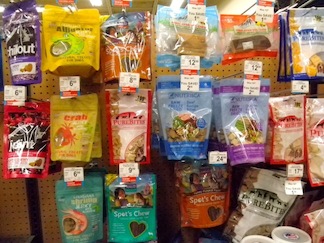
VIN News Service photo
Petco announced this week it is phasing out dog and cat treats made in China due to customer concerns about possible contamination. The treat aisle in one store near Seattle appears to be devoid of products made in China but carries a variety of offerings with prominent “Made in USA” labels.
Petco’s promise this week to stop selling dog and cat treats made in China does not involve pulling product from shelves or destroying unsold merchandise.
Rather, the company expects by the end of 2014 to complete a years-long effort to induce its suppliers to provide more products made in the United States and “other safe locations around the globe,” Petco spokeswoman Lisa Stark told the VIN News Service today.
“It’s a transition,” Stark said. “Yes, those (products made in China) are still in the store now, but at the end of the year, there will be no consumable dog or cat products on the shelves.”
Pet owners and many veterinarians have for years called on retailers to stop carrying pet treats made in China, particularly chicken jerky, which since 2007 has been associated with illness and death in pets, mostly dogs.
But an ongoing investigation by the U.S. Food and Drug Administration (FDA) has identified no contaminant that explains the illnesses. Suspect treats, by and large, have remained on the market.
In an
update posted Friday, the FDA said that as of May 1, it had received jerky treat case reports involving more than 5,600 dogs, 24 cats and three people. More than 1,000 of the dogs died. The illnesses have taken a variety of forms, including gastrointestinal upset,
liver disease, kidney or urinary disease, convulsions, tremors, hives and skin irritation.A written
announcement Tuesday from Petco quoted CEO Jim Myers as saying, “We know the FDA hasn’t yet identified a direct cause for the reported illnesses, but we decided the uncertainty of the situation outweighs the lack of actual proof.”
Asked why Petco will continue until the end of the year to sell product that may make pets sick, Stark cited the inconclusive FDA investigation. “There’s never been a definitive reason or mandated recall to pull product,” she said. “We don’t know for sure that the products are making anyone sick.”
The company decided to eliminate China-made pet treats in deference to consumer concern. “The reason we’re doing this is that we’ve heard from our customers that they are worried about these treats,” Stark said. “It is a process, and we’re taking some time. But we’re the first national retailer to make this decision.”
Petco is one of the largest pet store chains in the country, with more than 1,300 locations in the United States, Mexico and Puerto Rico. Less than a day after word spread that Petco would stop selling treats made in China, its chief rival, PetSmart, said it would do the same. PetSmart operates a similar number of stores in the United States, Canada and Puerto Rico.
PetSmart gave an even longer timeline for meeting its goal: March 2015.
The Huffington Post quoted PetSmart spokeswoman Michelle Friedman as saying that some customers like the treats that are made in China, and the company is trying to find similar substitutes. Meanwhile, Friedman said, “We don’t want to leave pet parents high and dry.”
While some observers applauded the companies for taking steps to eliminate potentially harmful pet treats, their sluggish schedule caused others to react with skepticism and scorn.
Dr. Kenton Flaig, owner of Portville Veterinary Clinic in western New York, shared on his clinic’s Facebook page a news article about the companies’ plans. He added this comment:
“Wow, Petco and PetSmart are great, proactive companies who really care about the health of your pets! Heck, they must be, ’cause they quit selling the pet treats made in China that are killing pets, right? Well, probably not.”
The veterinarian then offered a free flea and tick collar to the first reader who identifies the “little details buried in the article ... that expose the cynical business philosophy of both of these companies.”
In a telephone interview, Flaig said the companies deserve no credit as the first national retailers to reject pet treats made in China because they are trying to do so without risk or apology.
“They haven’t said, ‘We were wrong for carrying this stuff for seven years after ample evidence, some of it coming from the FDA, that these treats were implicated in pets’ deaths,’ ” Flaig said.
Instead, he said, Petco and PetSmart effectively are saying: “ ‘We’re still not going to stop selling it, and we’re not going to admit we were wrong. We’re not going to throw it in the garbage, and we’re going to continue to sell it at full value to unsuspecting customers. And we expect to be congratulated and patted on the back for being such good people.’ ”
Although Petco is projecting the end of 2014 to complete its transition away from pet treats made in China, individual stores already may have eliminated those products. For example, Stark said Petco stores no longer carry Canyon Creek Ranch jerky, a Nestle Purina brand made in China that has been implicated in cases of illness reported to the FDA.
Stark said the company also is removing rawhide products because much of it comes from China, although rawhide is not part of the FDA jerky investigation.
“As you can imagine, this has been a big process,” she said. “About five years ago, more than 90 percent of the treat category was coming from China, and today we’re down to about 50 percent in the jerky category, and Petco was on par with the industry. Again, that will be down to zero by the end of the year.”
Stark said new sources of pet treats, in addition to the United States, include Australia, New Zealand and South America.